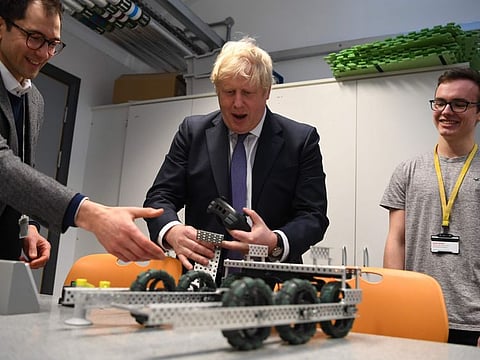Brexit: What will change?
A quick look at some of the things that will change on Friday, when the UK leaves the EU

London:
So, is Brexit big deal?
Yes. It’s the most important constitutional shake-up the United Kingdom has known since it joined the six-nation European Economic Community in 1973, and represents the first time the European institution has lost a member. The process plunged the UK into its worst political and constitutional crisis since the Second World War.
And there was lots of upheaval ...
The UK’s departure was repeatedly delayed amid a period of turmoil in the British parliament — which saw Boris Johnson replace Theresa May as prime minister and renegotiate the divorce deal. And the referendum cost David Cameron his job as PM too.
So, Brexit was a mess?
Yes. Brexit has brought three-and-a-half years of turmoil and uncertainty. The path to Brexit only was finally assured with Johnson leading the ruling Conservative party to an emphatic election victory in December. He got Brexit done.
Blue or burgundy?
The validity of documents such as driving licenses will not change, but from January 31 a British passport no longer makes you an EU citizen — even though EU travel benefits continue to apply during the transition period.
The transition period? What’s that?
Come February 1, the transition period begins. This is a time where the final details of the working and trade relationship between the UK and EU will be worked out. It’s like living apart when the divorce kicks in. It lasts until December 31 2020 right now, but can be extended until the end of 2021 if both sides agree.
Then what?
Well, both sides are free to go their own way after the divorce — but both the UK and the EU will try to be amicable as best they can. But you never know how things will work out.
Citizens or not ...
For more than 2 million EU citizens living in the UK and 1.5 million British citizens residing in the EU, a new deal protecting rights will come into force, replacing the rights guaranteed by EU membership. During the transition period things will stay as they are, but that may change down the road.
Change? Things like what?
Until at least December 31, EU benefits and protections such as freedom of movement, mobile phone roaming price caps and use of the blue EU channels at border points remain in place. There will be no changes at ferry ports such as Dover, or airports. Hiring a car in other EU countries will remain unchanged. Existing reciprocal health-care benefits remain in place.
Until December 31, taking a holiday or doing business in the EU should remain exactly the same as now.
But what happens then?
Well, that’s where the new Brexit talks come into play. They’ll discuss a free trade agreement and work out the fine details of the future relationship between the UK and the EU. Prime Minister Boris Johnson is adamant that deal will be done by the end of the year. Brussels? It doesn’t think so and says there are too many things still left to decide.
Like what?
Some relatively minor but worrying issues have already been partially settled. For example, the 650,000 retired British citizens already living in European countries have been told their pensions will continue to be uprated alongside inflation in line with those issued in the UK. But there is no agreement yet on what will happen to those retiring to another EU country after the end of this year.
Then there’s travel ...
Some countries are also making early plans for dealing with post-transition border arrangements. Ireland says British passport holders will be able to use a combined EU+UK channel at its ports and airports from December 31, but the Netherlands has indicated that UK travellers will be treated as “third-country nationals” unless an EU-level deal agrees otherwise.
... and driving ...
British drivers taking their car around the EU may also need permits after December 31, unless Johnson can include this in his deal.
... and workers’ rights
Johnson will also have to safeguard the long-term future of more protections such as workplace rights, working time limits and equality laws — all are up for re-negotiation.
So, will Brits be celebrating?
The 52 per cent who voted to leave will. Johnson is scheduled to make a televised address on Friday evening, stressing unity and the healing of divisions. As 11:01pm approaches, a countdown clock will be projected onto 10 Downing Street.
So, Brexit solves everything then?
Hardly. It has increased strains within the four nations that make up the United Kingdom itself. England (53 per cent) and Wales (52.5 per cent) voted to leave, whereas Scotland and Northern Ireland voted by 62 per cent and 56 per cent respectively to remain in the EU.
And what about Europe?
There is concern that the prolonged and often acrimonious Brexit process shifted attention from major global challenges, not least the battle to contain climate change. For many in Europe, the prospect of a rift between the UK and the EU weakens the continent at a time when the US China and Russia are becoming increasingly assertive.



